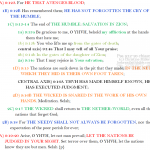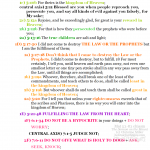Today’s Old Testament chronological reading is in Job 5 and 6.
The Psalms/ Proverbs reading is in Psalm 9.
The New Testament reading is in Matthew 7.
Psalm 9:1-11 Reverse parallelsim, and Psalm 9:12-20 and Matthew 5:1-8:1 Chiastic Structures.
Today I could not make a single structure from Psalm 9. But the two structures reflect each other – they are mirrors! In Scripture, when God repeats Himself, He is throwing a spotlight on the message. “This is important, and you don’t want to miss it!” Repetition is one of the teaching tools of Scripture. The central sections:
You sat upon the throne as the righteous Judge. 5 You have rebuked the nations, You have destroyed the wicked; You have blotted out their name forever and ever. 6 O enemy, the waste places have come to an end for ever; and the cities which you uprooted, their very memory is perished. 7 But YHVH is enthroned for ever; He has established His throne for judgment. 8 And He will judge the world in righteousness; He will minister judgment to the peoples with equity. Psa 9:5b-8
YHVH has made Himself known, He has executed judgment. Psa 9:16a
Then the central axis for Mat 5:1-8:1, Yeshua’s Sermon on the Mount, is from Mat 7:1-5:
“Judge not, that you be not judged. 2 For with what judgment you judge, you will be judged; and with the measure you use, it will be measured back to you. 3 And why do you look at the speck in your brother’s eye, but do not consider the plank in your own eye? 4 Or how can you say to your brother, ‘Let me remove the speck from your eye’; and look, a plank is in your own eye? 5 Hypocrite! First remove the plank from your own eye, and then you will see clearly to remove the speck from your brother’s eye.” Mat 7:1-5
Judge not – because there is only one Judge who judges righteously, and it is not you, O human, whoever you may be. And as Eliphaz illustrates from his speech in Job 4 and 5, his judgment of Job was not right. Job called Eliphaz’s words unpalatable, because he was so far off the mark. (Job 6:5-7).
Now we know right away that Yeshua is NOT telling us to not make judgments about right and wrong actions and behavior. We know, because He tells us in just a few more verses, TO make judgments based on behavior. (“You will know them by their fruits,” vs. 16.) We need to evaluate what fruit is being produced in someone’s life, and then make a judgment based on that fruit, whether we want to listen to them or not, or associate with them or not.
Also, Torah commands nations and communities to set up judges who will judge cases according to the Law. So what does Yeshua mean, when He says, “Judge not, that you be not judged?” “Judge” in Greek is krino, and it means, by implication, to try, condemn, or punish. We might make decisions based on someone’s fruit, and even pass a judgment in a court of Law based on someone’s action or behavior, but we are not to try the heart of another human being or condemn the heart of another human being. When we do that, we are taking on something only God can do.
We are to measure grace to people, and forgiveness, because the fact is, we are not at the point of judgment yet! Yeshua has not returned yet and has not separated the sheep from the goats. So there is still time for anyone to have their eyes opened, or for anyone to be saved and redeemed, even at the last hour! I know that when I stand before the Lord, I want grace and mercy measured to me (Mat 7:2), so I take care to measure it to others. I want to be given the benefit of the doubt!
Hebrew root words.
To judge. Strong’s H8199 שפט shaphat, a primitive root meaning “to pronounce sentence.” The 3-letter root is shin + pey + tet.
shin ש = two front teeth, thus sharp, press, eat, two, again
pey פ ,ף = the mouth, thus open, blow, scatter, edge
tet ט = the basket, thus surround, contain, hold, mud
The story: Pronouncing a word (shin, as spoken words pass through the teeth) with the mouth (pey); i.e., to make a decree, a proclamation, that holds (tet, as a basket holds whatever it contains) i.e., that passes the scrutiny of time and circumstances as a true word.
Links to previous studies.
Job 5 and 6, Discerning Eliphaz’s speech
Psalm 9, Those who know Your name
Psalm 9 Chiastic structure
Matthew 5 through 7 Chiastic structure
Matthew 7, Just measures
Matthew 7, Saying, ‘Lord, Lord’
Matthew 7, Planks and specks
JANUARY 2020 BIBLE STUDY SCHEDULE | 2020 FULL YEAR READING SCHEDULE




















Leave a Reply